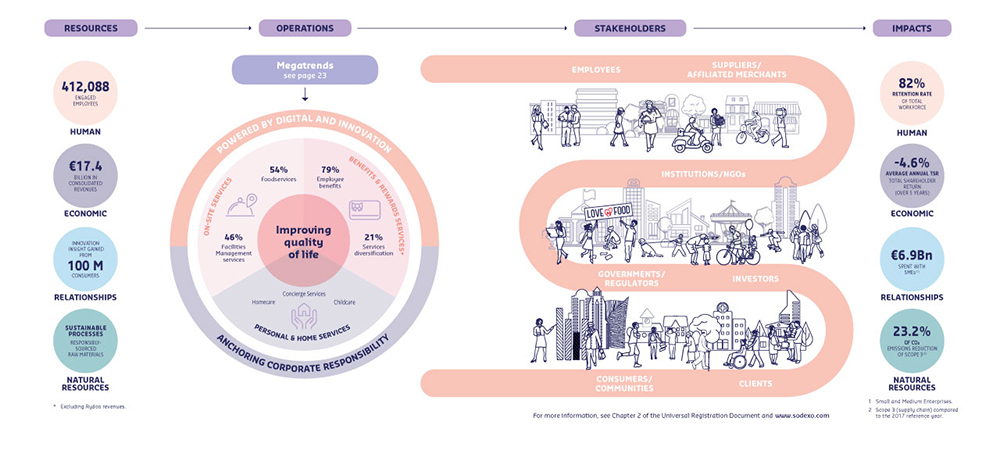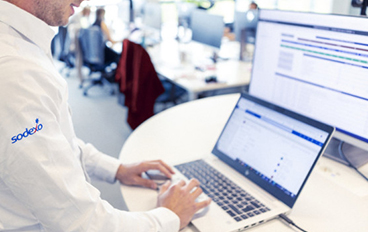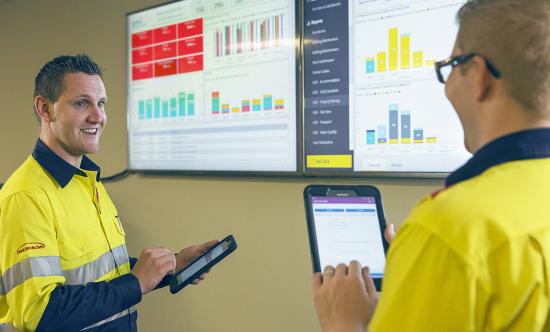Being a leader in our sector means continually increasing our competitiveness – in terms of both our offering and our organization – and accelerating our transformation. Our goal is to generate solid, profitable and responsible growth over the long term.
How we create value
Our success as a service provider, employer and corporate citizen depends on our ability to build an enduring relationship with all of our stakeholders. This is how we create a sustainable and shared value creation model:

The Megatrends influencing our strategy
Preparing for the long-term future means integrating the world’s great transformations. We constantly fine-tune our strategy by defining and analyzing major megatrends with demographic, social, environmental, economic and technological implications.

Demographic changes
Developed countries are faced with rapidly aging populations due in part to slow population growth and an increase in life expectancy. Meanwhile, developing countries are expected to achieve 18.5% average population growth between 2015 and 2030.

Public deficits
Between now and 2030, heavy Covid-related public deficits will continue to strongly impact public policies and taxation. The weight of public debt should lead governments to consider more efficient ways to provide public services and to outsource certain services.

Urbanization
Rapid urbanization is contributing to the increase in GDP per capita, but the emergence of mega-cities (>10 million inhabitants) is creating enormous economic and social challenges. Urbanization projects are expected to be impacted in the short term but will continue to expand in the long term.

Environmental issues
8.6 billion inhabitants by 2030: the demographic boom is putting pressure on natural resources, heightening global warming and disrupting traditional consumer models. The Covid-19 pandemic has raised awareness of this issue.

Emerging middle classes
Education and technology are transforming consumer modes and habits. The middle classes, whose purchasing power is on the rise and which will represent most consumers by 2022, are dedicating an increasing share of their budget to health and wellness, leisure and culture.

Empowered consumers
Consumers and clients now have unlimited access to information and expect personalized services and experiences. The current crisis has definitely accelerated this trend, empowering consumer communities.

Globalized economy
Capital, information and talent are now interconnected, providing companies with new sources of growth. However consumers are also increasingly favoring local products and convenience services.

Digital transformation
The development of technology is disrupting the relationship between companies and users and generating new expectations. As the value of data grows, offering new insights and usages, companies are able to increasingly personalize their offering.

Developing economies
Developing markets are creating wealth for millions of people. Their weight in the world economy is increasing due to rapid population growth – seven times faster than that of developed countries – and the rise of the middle class.

Ownerhip vs. Use
Why buy if you can subscribe or rent? Collaborative platforms are revolutionizing business models and buying behaviors. The lower capital intensity of these business models can accelerate growth.

The future of work
Disruptive technologies such as artificial intelligence, robotics and the Internet of Things are all profoundly transforming the working world. To succeed, businesses must support employability and attract talent.
Strategies influencing how we work
Our strategy also relies on the analysis of the dynamics of the competitive environment within which we operate. For this reason specific strategies address the way we work.

Corporate Responsibility strategy
Today, more than ever, our responsibility is to act in close collaboration with all of our stakeholders for a global positive impact. Sodexo’s key corporate responsibility issues and their impacts are identified and prioritized through a materiality assessment. This enables us to manage risks and seize the associated opportunities.

Risk Management strategy
Sodexo faces a certain number of internal and external risks and uncertainties in its operations. To address them and safeguard its values, an organization and policies have been created aimed at identifying, evaluating, preventing and managing these risks to limit their negative impact.
